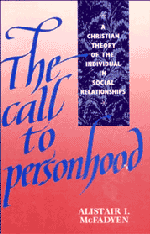3 - The social formation of persons
Published online by Cambridge University Press: 03 May 2011
Summary
I am concerned in this book to explore the possibility of conceiving individuality and personhood in social and communication terms. The major and critical issue in this is how persons are formed and may be transformed. The issues and conceptions relating to this question which are the most crucial for the thesis I am advancing are dealt with in this and the following chapter. Together they therefore stand at the very heart of my argument. The basis of the position I shall be taking on these issues is the understanding of persons as individuals whose consciousness, experience of and interaction with the world are internally centred. Conducting oneself from a personal centre of being and communication is what makes self-direction – that is, personal control of and intervention in oneself and one's interactions – possible. In other words, personal centring enables performance as a subject in communication, being an I for and before others and for oneself (through self-reflection and consciousness). As a person one understands oneself as a unified source of interaction, consciousness and experience who has continuity through different times and places. All one's consciousness, experience and action in different times and places are centred on oneself and therefore form a continuous point of identity.
But how does such personal centring come about? Does everybody have some internal organ of unity, a personal centre or self, simply by virtue of his or her natural constitution as a human being?
- Type
- Chapter
- Information
- The Call to PersonhoodA Christian Theory of the Individual in Social Relationships, pp. 69 - 110Publisher: Cambridge University PressPrint publication year: 1990

